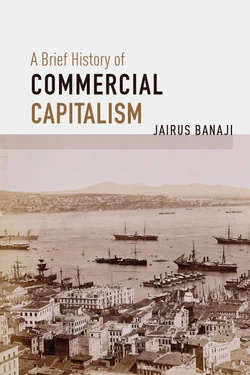A Brief History of Commercial Capitalism

Blurb
The rise of capitalism to global dominance is still largely associated – by both laypeople and Marxist historians – with the industrial capitalism that made its decisive breakthrough in 18th century Britain. Jairus Banaji’s new work reaches back centuries and traverses vast distances to argue that this leap was preceded by a long era of distinct “commercial capitalism”, which reorganised labor and production on a world scale to a degree hitherto rarely appreciated. Rather than a picture centred solely on Europe, we enter a diverse and vibrant world. Banaji reveals the cantons of Muslim merchants trading in Guangzhou since the eighth century, the 3,000 European traders recorded in Alexandria in 1216, the Genoese, Venetians and Spanish Jews battling for commercial dominance of Constantinople and later Istanbul. We are left with a rich and global portrait of a world constantly in motion, tied together and increasingly dominated by a pre-industrial capitalism. The rise of Europe to world domination, in this view, has nothing to do with any unique genius, but rather a distinct fusion of commercial capitalism with state power.Book summary
This book by Jairus Banaji is in both its scope and depth. It goes beyond the breakthrough of industrial capitalism in 18th century Britain to centuries earlier and across continents to argue that industrial capitalism in England was preceded by a long era of distinct “commercial capitalism”. We particularly appreciate that Banaji presents a diverse and vibrant world, including Muslim merchants trading in Guangzhou in the 8th century, thousands of European traders in Alexandria in the 12th century, and the battles for commercial dominance between Genoese, Venetians and Spanish Jewish traders in Constantinople, rather than a picture centered solely on Europe. The rise of Europe to world domination, then, has nothing to do with any unique European characteristics, but rather must be understood as a distinct fusion of commercial capitalism with state power. Through thinking of “theory as history,” Banaji’s approach skilfully ties history and economics together. Though also distinctly Marxist, this book is highly relevant and accessible to anyone interested in the history of capitalism.

